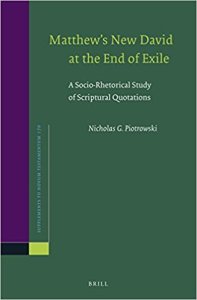2020.10.18 | George Branch-Trevathan. The Sermon on the Mount and Spiritual Exercises: The Making of the Matthean Self. NovTSup 178. Leiden: Brill, 2020. ISBN 978-90-04-42444-9.
Review by Charles Nathan Ridlehoover, Columbia International Seminary.
George Branch-Trevathan is Assistant Professor of Religion at Thiel College, Greenville, PA. As a recent graduate of Emory University (PhD), Branch-Trevathan presents in The Sermon on the Mount and Spiritual Exercises: The Making of the Matthean Self a revised version of his doctoral dissertation. The following monograph is an ambitious project. Although Branch-Trevathan begins with a simple enough question (and incidentally ends with the same question): how do people attain rigorous moral ideals? —the answer is much more complicated.
Read the rest of this entry »


